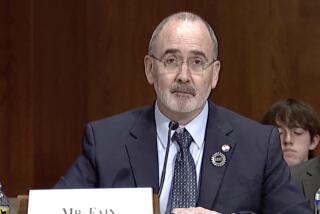Roth Urges Panel to Look at 4-Day Week for Judges
- Share via
SANTA ANA — Supervisor Don R. Roth urged a committee on Orange County’s criminal justice system Friday to study a proposed four-day workweek for judges, saying the plan would increase efficiency and therefore ease jail overcrowding.
Last month, Roth first brought up the idea of judges working 10-hour days four days a week. He said at the time that judges he had consulted were enthusiastic about the plan.
“I wish to stress that there is no reduction in work hours,” Roth, chairman of the Board of Supervisors, said in the memo to the committee. “Each employee will still work a 40-hour week. . . , (but) the work schedule is adjusted so that the court is open 10 hours per day Monday through Friday.”
The courts would be available weekdays from 7:30 a.m. to 6:30 p.m., with one team of judges working Monday through Thursday and another team working Tuesday through Friday.
The advisory panel, the Legal Judicial Systems Committee, is composed of county supervisors and their staffs, judges, prosecutors, public defenders, marshal’s office and a member from the League of Cities.
Judges in the Torrance-based South Bay Municipal Court in Los Angeles County last month became the first in the state to start such a system. Four judges have been put on the shorter workweek, and a fifth “floater” judge fills in for the others when they are off.
South Bay Court Administrator Christopher Crawford said the reaction from judges has been favorable in the 90-day pilot project. He said the court will interview prosecutors, defense attorneys, judges and court staff members when the project ends.
Roth said a four-day week would mean fewer overtime hours, less sick time taken, increased productivity, increased morale, more trial time and better use of facilities.
Disadvantages, he said, might include employee and juror fatigue, increased workloads and scheduling problems for child care.
One problem has popped up unexpectedly during the Los Angeles experiment, Crawford said: Employers of jurors expected them to be at work the fifth day.
“It was a problem we did not anticipate,” he said. “We never even considered it. I am sure there will be others.”
As a consequence, juries are meeting for just eight hours a day, with jurors returning to regular jobs the fifth day, Crawford said.
“There was no other way around it,” he said.
Roth noted in the memo that many law-enforcement agencies in the county have used the four-day week for years.
“There have been few problems, and morale and efficiency have been improved,” he said, adding that a four-day week would help ease traffic and is “highly recommended by air quality and transportation planners.”
More to Read
Sign up for Essential California
The most important California stories and recommendations in your inbox every morning.
You may occasionally receive promotional content from the Los Angeles Times.













